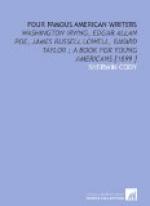When he went to work at West Chester his reading was chiefly poetry and travel. The result of his “fireside travels” we shall soon see. The way in which he read poetry may be gathered from the following extract from a letter to one of his comrades:
“By the way, what do you think of Bryant as a poet, and especially of ’Thanatopsis? For my part, my admiration knows no bounds. There is an all-pervading love of nature, a calm and quiet but still deep sense of everything beautiful. And then the high and lofty feeling which mingles with the whole! It seems to me when I read his poetry that our hearts are united, and that I can feel every throb of his answered back by mine. This is what makes a poet immortal. There are but few who make me feel so thrillingly their glowing thoughts as Bryant, Longfellow, Whittier, and Lowell (all Americans, you know), and these I love. It is strange, the sway a master mind has over those who have felt his power.”
Another poet of whom he was an enthusiastic admirer was Tennyson. He had read a criticism by Poe. “I still remember,” he wrote afterward, “the eagerness with which as a boy of seventeen, after reading his paper, I sought for the volume; and I remember also the strange sense of mental dazzle and bewilderment I experienced on the first perusal of it. I can only compare it to the first sight of a sunlit landscape through a prism; every object has a rainbow outline. One is fascinated to look again and again, though the eyes ache.”
He contributed several poems to the Saturday Evening Post, and then wrote to Rufus W. Griswold, who, besides being connected with the Post, was the editor of Graham’s Magazine, the leading literary periodical at that time. Those of us who know the life of Poe remember Griswold as the man who pretended to be his friend, but who after Poe’s death wrote his life, filling it with all the scandalous falsehoods he could hear of or invent. To Bayard Taylor, however, he seems to have been a helpful friend.
“I have met with strange things since I wrote last,” writes Taylor to a school friend in March, 1843. “Last November I wrote to Mr. Griswold, sending a poem to be inserted in the Post. However, I said that it was my highest ambition to appear in Grahams Magazine. Some time ago I got an answer. He said he had read my lines ’To the Brandywine,’ which appeared in the Post, with much pleasure, and would have put them in the magazine if he had seen them in time. He said the poem I sent him would appear in April in the magazine, and requested me to contribute often and to call on him when I came to town. I never was more surprised in my life.”




